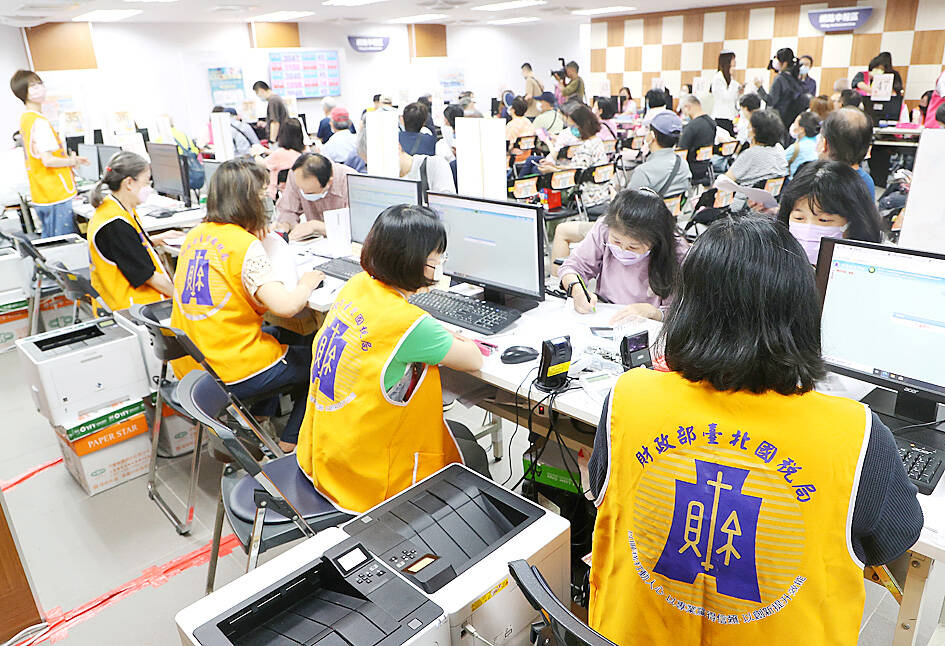The government last month received NT$159 billion (US$4.91 billion) in tax revenue, a 21 percent increase from a year earlier, thanks mainly to stock and property transactions, the Ministry of Finance said on Friday.
Tax revenue from securities transactions spiked more than twofold to NT$25.8 billion, as daily turnover last month soared 76 percent year-on-year to NT$467.5 billion, the ministry’s monthly report showed.
“Last month saw the TAIEX going through wild ups and downs linked to an ongoing AI [artificial intelligence] frenzy and Taiwan Semiconductor Manufacturing Co’s [TSMC, 台積電] conservative outlook about peers,” ministry statistics official Liu Shun-rong (劉訓蓉) told an online news conference.

Photo: CNA
As a result, the local exchange shed more than 1,000 points after TSMC’s earnings guidance, but staged rapid rebounds days later, Liu said, adding that investors by and large remain positive about the business opportunities fast-growing AI applications would bring, Liu said.
Taiwan is home to the world’s major suppliers of advanced chips, high-end servers, storage, and memory devices used in AI infrastructure and solutions.
At the same time, tax revenue from land value gains rose 44.2 percent to NT$7.5 billion on the back of property transactions, Liu said.
Property deals in the nation’s six special municipalities soared 43 percent year-on-year to 22,900 units last month, supported by a government interest subsidy and other favorable lending terms for first-home purchases.
However, the property market could slow a bit moving forward, as the low base effect would increasingly fade away and the central bank’s interest rate hike in March would help rein in buying interest, Liu said.
Cumulative tax revenues in the first four months of the year totaled NT$716.5 billion, suggesting a 15.8 percent pickup from the same time last year and exceeding the government’s target by 15.7 percent, the ministry said.

When an apartment comes up for rent in Germany’s big cities, hundreds of prospective tenants often queue down the street to view it, but the acute shortage of affordable housing is getting scant attention ahead of today’s snap general election. “Housing is one of the main problems for people, but nobody talks about it, nobody takes it seriously,” said Andreas Ibel, president of Build Europe, an association representing housing developers. Migration and the sluggish economy top the list of voters’ concerns, but analysts say housing policy fails to break through as returns on investment take time to register, making the

‘SILVER LINING’: Although the news caused TSMC to fall on the local market, an analyst said that as tariffs are not set to go into effect until April, there is still time for negotiations US President Donald Trump on Tuesday said that he would likely impose tariffs on semiconductor, automobile and pharmaceutical imports of about 25 percent, with an announcement coming as soon as April 2 in a move that would represent a dramatic widening of the US leader’s trade war. “I probably will tell you that on April 2, but it’ll be in the neighborhood of 25 percent,” Trump told reporters at his Mar-a-Lago club when asked about his plan for auto tariffs. Asked about similar levies on pharmaceutical drugs and semiconductors, the president said that “it’ll be 25 percent and higher, and it’ll

CHIP BOOM: Revenue for the semiconductor industry is set to reach US$1 trillion by 2032, opening up opportunities for the chip pacakging and testing company, it said ASE Technology Holding Co (日月光投控), the world’s largest provider of outsourced semiconductor assembly and test (OSAT) services, yesterday launched a new advanced manufacturing facility in Penang, Malaysia, aiming to meet growing demand for emerging technologies such as generative artificial intelligence (AI) applications. The US$300 million facility is a critical step in expanding ASE’s global footprint, offering an alternative for customers from the US, Europe, Japan, South Korea and China to assemble and test chips outside of Taiwan amid efforts to diversify supply chains. The plant, the company’s fifth in Malaysia, is part of a strategic expansion plan that would more than triple

Taiwanese artificial intelligence (AI) server makers are expected to make major investments in Texas in May after US President Donald Trump’s first 100 days in office and amid his rising tariff threats, Taiwan Electrical and Electronic Manufacturers’ Association (TEEMA, 台灣電子電機公會) chairman Richard Lee (李詩欽) said yesterday. The association led a delegation of seven AI server manufacturers to Washington, as well as the US states of California, Texas and New Mexico, to discuss land and tax issues, as Taiwanese firms speed up their production plans in the US with many of them seeing Texas as their top option for investment, Lee said. The